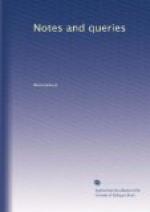To facilitate reference to the queries, I take them in the order of publication:—
1. “What is the earliest known instance of the use of a beaver hat in England?”—T. Hudson Turner, p. 100.
The following instance from Chaucer (Canterbury tales, 1775, 8 deg.. v. 272.), if not the earliest, is precise and instructive:
“A marchant was ther with a forked
berd,
In mottelee, and highe on hors he sat,
And on his hed a Flaundrish bever hat.”
2. “Has Cosmopoli been ever appropriated to any known locality?”—John Jebb, p. 213.
Cosmopolis has been used for London, and for Paris (G. Peignot, Repertoire de bibliographies speciales, Paris, 1810. 8 deg.. pp. 116, 132.) It may also, in accordance with its etymology, be used for Amsterdam, or Berlin, or Calcutta, etc. As an imprint, it takes the dative case. The Interpretationes paradoxae quatuor evangeliorum of Sandius, were printed at Amsterdam. (M. Weiss, Biographie universelle, Paris, 1811 28. 8 deg.. xl. 312.)
3. References to “any works or treatises supplying information on the history of the Arabic numerals” are requested by “E.N.” p. 230.
To the well chosen works enumberated by the querist, I shall add the titles of two valuable publications in my own collection:
DICTIONNAIRE RAISONNE DE DIPLOMATIQUE—par dom de Vaines. Paris, 1774. 8 deg.. 2 vol.
ELEMENTS DE PALEOGRAPHIE, par M. Natalis de Wailly. Paris, Imprimerie royale, 1838. 4 deg.. 2 vol.
The former work is a convenient epitome of the Nouveau traite de diplomatique. The latter is a new compilation, undertaken with the sanction of M. Guizot. Its appearance was thus hailed by the learned Daunou: “Cet ouvrage nous semble recommandable par l’exactitude des recherches, par la distribution methodique des matieres et par l’elegante precision du style.” (Journal des savants, Paris, 1838. 4 deg.. p. 328.)
A query should always be worded with care, and put in a quotable shape. The observance of this plain rule would economise space, save the time which might otherwise be occupied in useless research, and tend to produce more pertinency of reply. The first and second of the above queries may serve as models.
Bolton Corney.
* * * * *
REPLIES TO MINOR QUERIES.
Old Auster Tenement (No. 14. p. 217.).—I think that I am in a condition to throw some light on the meaning of this expression, noticed in a former Number by “W.P.P.” The tenements held in villenage of the lord of a manor, at least where they consisted of a messuage or dwelling-house, are often called astra in our older books and court-rolls. If the tenement was an ancient one, it was vetus or antiquum astrum; if a tenure of recent creation (or a new-take, as it is called in some manors), it




